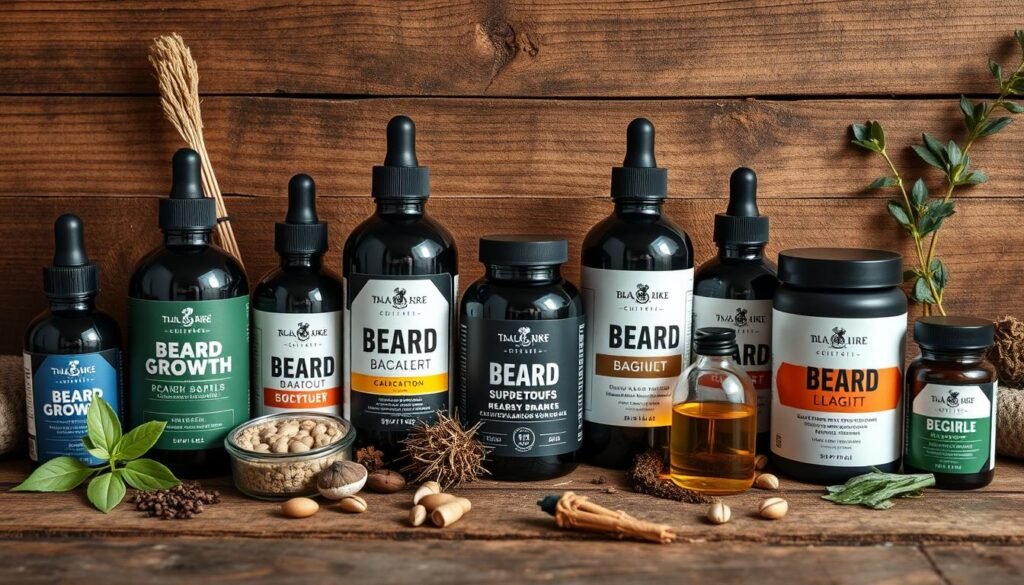
Many men dream of having a full, healthy beard. But finding the right path can be tough. Some try beard growth supplements, but their success is not always clear. Beard growth depends on many things, like your lifestyle, diet, and genes.
In this guide, we’ll look at the best beard growth supplements. We’ll also talk about key nutrients and lifestyle changes that help grow facial hair.
In the U.S., the FDA doesn’t check supplements like it does prescription drugs. This means you need to pick products tested by others. Always talk to a doctor before starting any new supplement.
Key Takeaways
- Beard growth is influenced by various factors, including lifestyle, nutrition, and genetics.
- Supplements like biotin, collagen, zinc, and saw palmetto are commonly marketed for beard growth, but the evidence supporting their effectiveness is limited.
- The FDA does not regulate supplements like prescription drugs, so it’s important to choose third-party tested products and consult with a healthcare provider.
- Clinical trials for supplements affecting beard growth are scarce, with most research focused on general hair growth in females.
- Protein, vitamins, and minerals play crucial roles in supporting healthy beard growth, but the optimal dosages are still being studied.
Introduction to Beard Growth Supplements
Many men dream of having a full, luscious beard. But, beard growth is more complex than just supplements. Good nutrition, like enough protein, vitamins, and minerals, is key. Yet, other factors also play a big role.
Importance of Nutrients for Healthy Beard Growth
Vitamins and minerals like biotin, vitamin D, and zinc are vital for beard health. They feed hair follicles, encourage new growth, and make hairs stronger. Eating a balanced diet with these nutrients helps your beard grow well.
Factors Influencing Beard Growth Beyond Supplements
But, things like genetics, hormones, stress, and lifestyle also affect beard growth. Genetics, in particular, greatly influence beard thickness, rate, and quality. Working on these factors is as important as using supplements.
| Nutrient | Benefits for Beard Growth |
|---|---|
| Biotin (Vitamin B7) | Vital for keratin synthesis, can reduce hair loss and stimulate new growth |
| Vitamin D | Stimulates hair follicles, promoting beard growth and thickness |
| Zinc | Boosts hair growth in individuals deficient in this mineral |
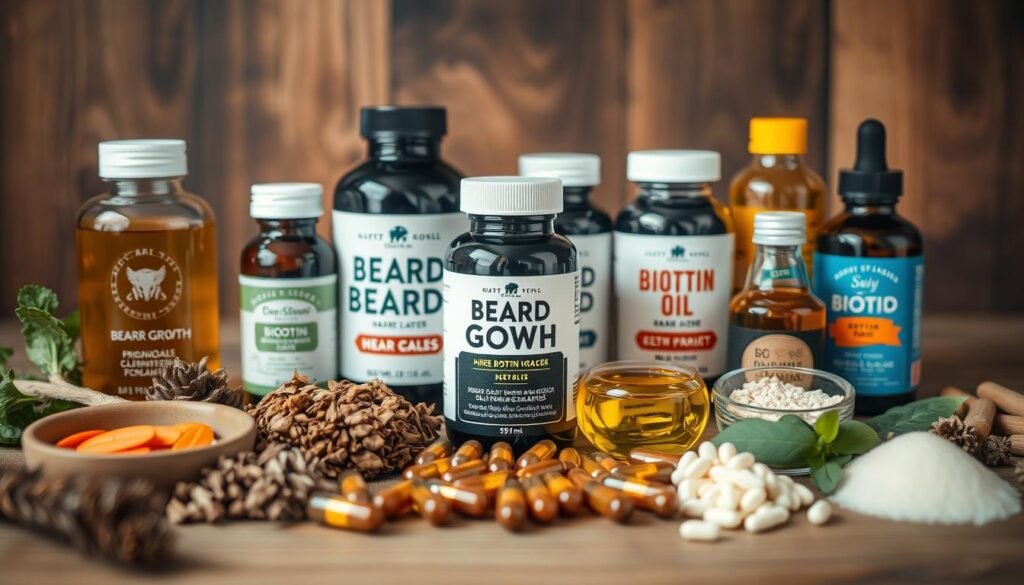
“Beard growth is primarily determined by genetics. Most men have similar levels of testosterone, which is not the main factor influencing beard growth.”
Understanding the role of nutrition and other factors helps men achieve their beard goals. Supplements are helpful, but a healthy lifestyle and addressing underlying causes are just as important. This way, you can grow a full, healthy beard.
The Role of Protein in Beard Growth
Protein is key for healthy hair, including beard hair. While there aren’t many studies on protein and beard growth, experts agree. They say eating enough protein for beard growth is important.
Protein helps build hair follicles and the keratin in beard hair. This keeps facial hair strong and growing. Good sources of high-protein foods for beard growth include:
- Lean meats like chicken, turkey, and fish
- Eggs
- Legumes such as lentils, beans, and peas
- Nuts and seeds
- Dairy products like Greek yogurt and cottage cheese
Some supplements like biotin, vitamin C, vitamin E, and zinc might also help. They support hair follicle health and keratin production. But, we need more research to know for sure.
| Nutrient | Potential Benefits for Beard Growth |
|---|---|
| Biotin | Improves hair thickness and growth, especially in those with a deficiency |
| Vitamin C | Enhances hair density and reduces hair loss |
| Vitamin E | Significantly boosts hair growth |
| Zinc | Supports protein synthesis and hair growth, especially in those with a deficiency |
Eating high-protein foods for beard growth and using supplements can help. This makes facial hair healthier and fuller. It leads to a more impressive, well-groomed look.
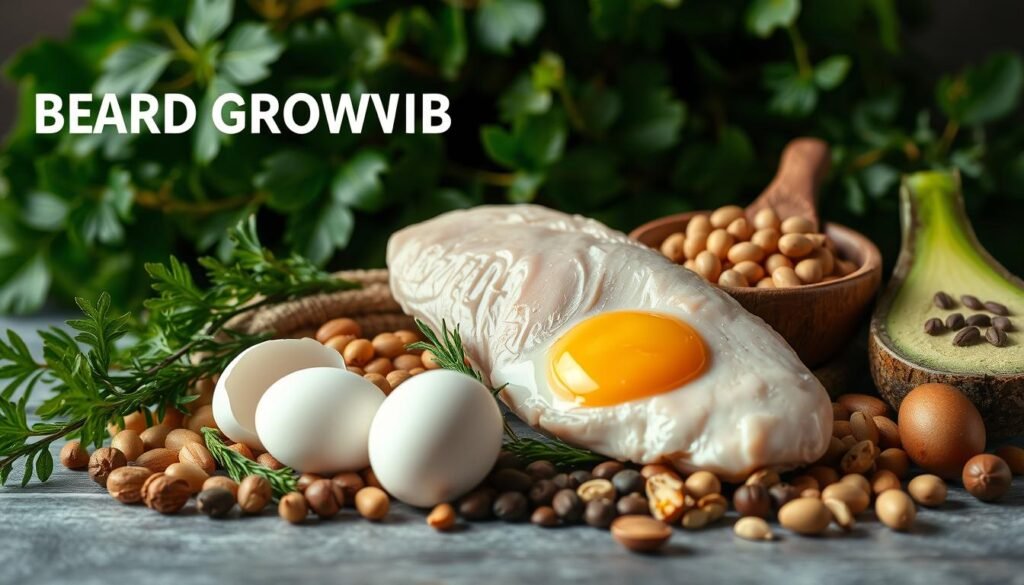
Beard Growth Supplements That Work
Beard growth supplements like biotin are very effective. Biotin, or vitamin B7, helps make keratin, a key hair protein. Taking biotin can make your beard hair stronger and healthier.
Biotin: A Vital Nutrient for Beard Growth
The daily biotin need is 30-35 micrograms. But, there’s no set amount for the best beard growth. The best supplements mix biotin with vitamins A, B6, B12, C, D, E, and zinc.
- Biotin is key for keratin, a hair protein.
- Fixing biotin lack stops slow hair growth and loss.
- Supplements with biotin and other nutrients work best for beard growth.
A top beard growth supplement with biotin gets 4.8 out of 5 from 1,725 reviews. It lasts a month with 60 capsules. With a 15% discount using code GROW, it’s a good buy for beard growth.

“Biotin is a game-changer for my beard growth. After taking these supplements for 3-6 months, I noticed a significant improvement in the thickness and fullness of my facial hair.”
Biotin is key for beard growth, but genetics, age, and lifestyle matter too. Using a top beard growth supplement and a healthy lifestyle gets you the best beard.
Collagen: Promoting Beard Hair Elasticity
Collagen is key for a healthy beard. It’s a protein in skin, hair, and nails. Some studies say collagen helps hair by giving it what it needs and making it less likely to break.
Eating foods like bone broth and chicken skin helps your beard. Collagen supplements can also support your beard and hair.
Biotin, vitamin C, and zinc are also important for a healthy beard. Eating well and maybe taking supplements can help you get the beard you want.
“Collagen is the glue that holds our hair and skin together, and by providing the building blocks for healthy hair growth, it can contribute to a fuller, more vibrant beard.”
Adding collagen to your beard care can change your look. You can get it from food or supplements.
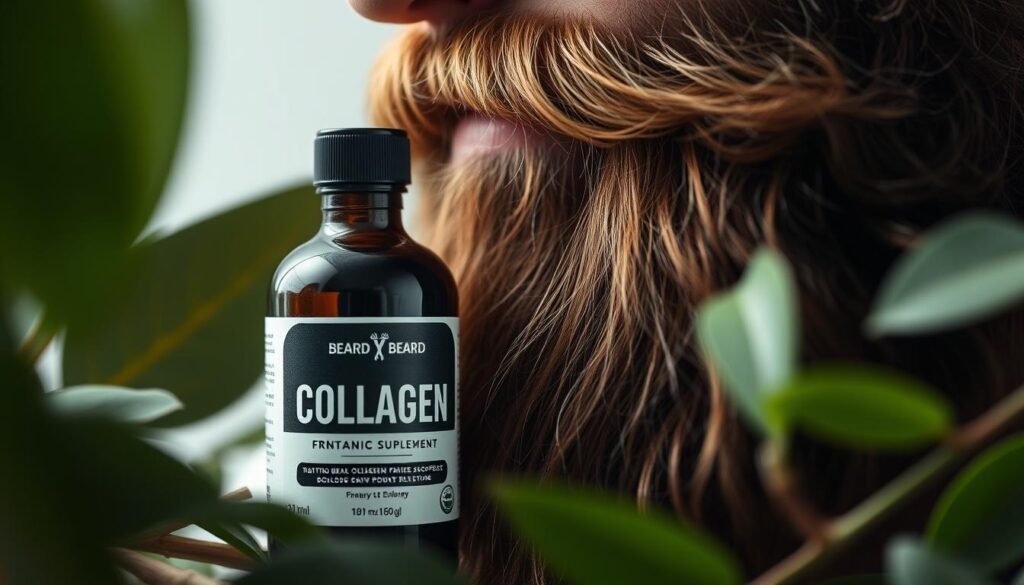
But, always talk to a doctor before taking new supplements. Collagen can help your beard, but a good beard care plan is key. This way, you can get the beard you dream of.
Zinc: Supporting Protein Synthesis and Hair Growth
Zinc is a key mineral for hair and beard growth. It helps in making proteins and growing hair. Eating foods like oysters, red meat, poultry, and pumpkin seeds can help.
Zinc helps your hair grow faster and stronger. Without enough zinc, your hair might fall out more. Signs of zinc lack include too much hair loss, brittle hair, and scalp problems.
Studies show zinc supplements can help grow hair. They work well for alopecia areata and female hair loss. Zinc helps make keratin, which makes hair strong.
Men need 9.5 milligrams of zinc daily, and women need 7 milligrams. Too much zinc can harm your health. Always talk to a doctor before taking zinc supplements.
| Nutrient | Recommended Daily Intake | Food Sources |
|---|---|---|
| Zinc | 9.5 mg for men, 7 mg for women | Oysters, red meat, poultry, pumpkin seeds |
Zinc works better with other nutrients like L-cystine. This combo can make your hair stronger. Always check with a doctor before taking zinc supplements.
Beard growth supplements that work
Beard growth supplements are a topic of debate. Some claim to boost beard growth a lot, but the science is limited. Yet, effective beard growth supplements do offer benefits for hair and beard health.
Supplements with biotin, collagen, and zinc are known to help. Biotin helps keep hair healthy by making keratin. Zinc is key for DNA, cell division, and protein, all important for hair growth.
| Ingredient | Benefits for Beard Growth |
|---|---|
| Biotin | Helps maintain normal hair growth by supporting keratin production |
| Collagen | Provides essential building blocks for hair follicles and enhances hair elasticity |
| Zinc | Crucial for DNA synthesis, cell division, and protein synthesis, important for hair growth |
These nutrients support beard growth, but the best way is to fix nutritional gaps. Eating well and living healthy are key. How well supplements work depends on many things, like how your body reacts and your diet.
“Biotin, when used in supplements like beard gummies, aids in promoting hair growth, skin health, and nail strength.”
In summary, effective beard growth supplements with biotin, collagen, and zinc can help. But, the best way to grow a great beard is to eat right and live healthy.
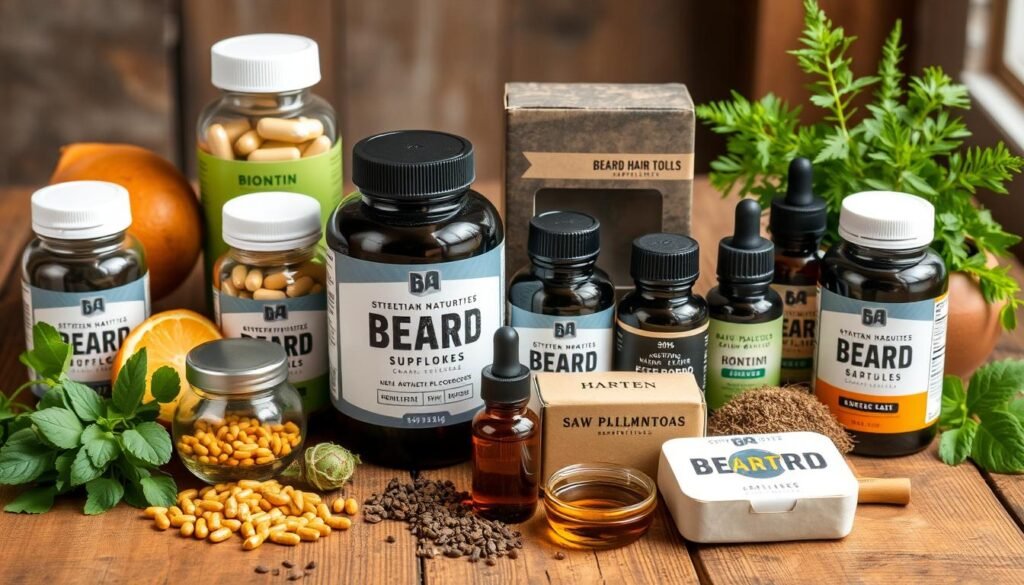
Lifestyle Factors for Optimal Beard Growth
Getting a full, healthy beard is not just about supplements. Your lifestyle choices matter a lot. Stress management and quitting smoking are key. These actions, along with a good diet and grooming, help your beard grow thick and vibrant.
Managing stress is vital for beard growth. Stress can lower testosterone, which is needed for a healthy beard. Try to reduce stress with exercise, meditation, or nature walks. Quitting smoking is also crucial because cigarettes harm hair follicles and slow growth.
Keeping a healthy weight is also key. Obesity can lower testosterone, which affects beard growth. Stay active and eat well to support testosterone and beard growth.
Limiting ultra-processed foods and sugary drinks helps too. These can cause inflammation and hormonal issues, harming your beard. Eat foods rich in vitamins and antioxidants to nourish your body and beard.
By making these lifestyle changes, you can support your beard’s growth. Remember, a full beard comes from a mix of factors. These changes are important for your facial hair goals.
“Maintaining a healthy lifestyle is key to achieving and maintaining a full, healthy beard.”
Natural Remedies for Beard Growth
Some people like to use natural remedies instead of supplements for beard growth. Herbs like horsetail and saw palmetto are popular for this. They might help your beard grow fuller and healthier.
Herbs and Plants for Beard Growth
Horsetail is full of silicon and other good stuff. It might make your hair better and thicker. This could help your beard grow fuller. Saw palmetto might also help with hair growth because it blocks certain hormones.
Using these natural remedies with a good diet and grooming can help your beard grow. But, always talk to a doctor before trying new things. This makes sure they’re safe and work well for you.
Remember, growing a beard takes time and patience. You can’t make it grow faster. Focus on being healthy and consistent for the best results.
| Herb/Plant | Potential Benefits for Beard Growth |
|---|---|
| Horsetail (Equisetum arvense) | Rich in silicon and other compounds that may improve hair quality and thickness |
| Saw Palmetto (Serenoa repens) | Anti-androgenic properties that may influence hair growth, though more research is needed |
“Incorporating natural remedies, alongside a balanced diet and proper grooming, may provide a holistic approach to cultivating the facial hair of your dreams.”
Addressing Common Beard Growth Concerns
Getting a full, healthy beard can be tough for some. This is due to genetics, hormonal issues, and health problems. People often face patchiness, slow growth, or trouble growing a beard at all. Supplements and lifestyle changes can help, but seeing a doctor is key. They can offer advice and help improve beard growth.
For those dealing with common beard growth problems, there are solutions for beard growth issues to try:
- Make sure you get enough vitamins and minerals like Vitamin D, B Complex, Vitamin E, and C. They help your hair and beard grow.
- Exfoliate regularly to get rid of dead skin and help hair follicles grow.
- Try using a dermaroller or minoxidil to boost blood flow and hair growth. But talk to a pro first.
- Keep stress levels down. High stress can mess with hormones and slow beard growth.
- Live a healthy life with a good diet, exercise, and enough sleep. This helps your hair and beard stay healthy.
| Vitamin/Mineral | Benefits for Beard Growth |
|---|---|
| Vitamin D | Boosts facial hair growth by striking a hormonal balance and triggering testosterone production. |
| B Complex Vitamins | Help the body produce energy and build crucial molecules within cells, supporting hair growth. |
| Vitamin E | Protects skin against cell damage and delays the aging of cells, promoting healthy hair follicles. |
| Vitamin C | Boosts blood circulation in tiny blood vessels, supplying essential nutrients to hair follicles. |
While supplements and lifestyle changes can help, it’s vital to tackle any health or hormonal issues. See a doctor to create a plan that fits your beard growth needs.
“Facial hair growth is intricately linked to genetic makeup, and maintaining a healthy lifestyle, cleanliness, and hydration can support beard growth for those genetically predisposed.”
Conclusion
Many supplements claim to help grow beards, but the science is not strong. To grow a full, healthy beard, you need more than just supplements. Eating right, living well, and fixing growth problems are key.
Using a holistic approach and talking to doctors can help. Products like the Neofollics Beard Growth Kit can really help. Eating well, exercising, and sleeping enough also boost beard growth.
Supplements can help, but growing a beard takes more. It’s about the right food, lifestyle, and treatments. With the right knowledge, men can grow the beard they want, slowly but surely.
